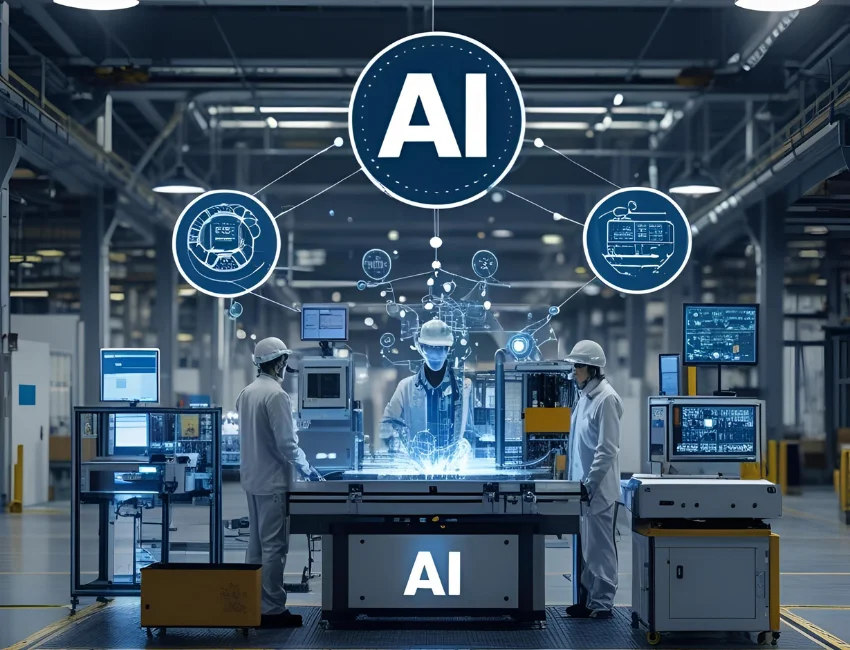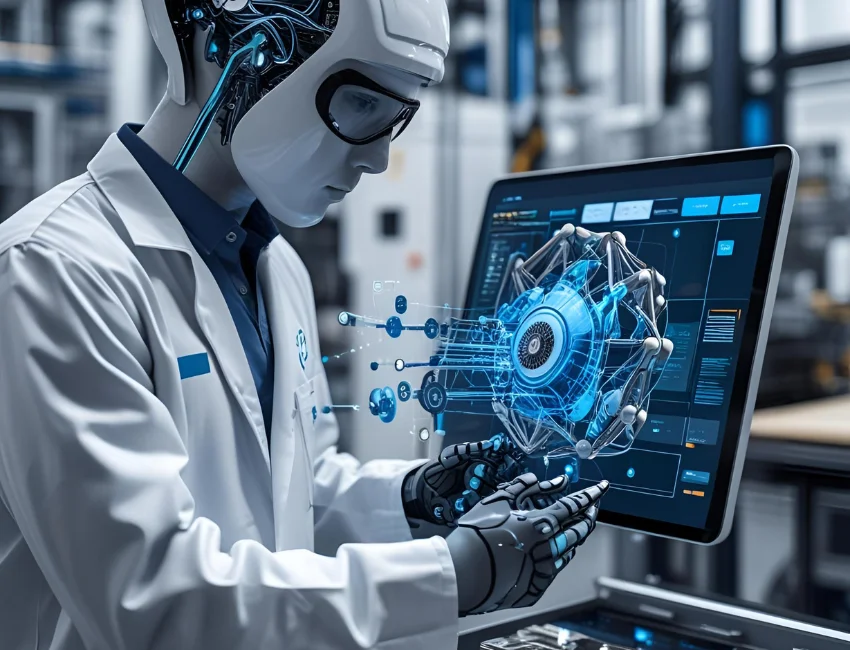

Are you ready to disrupt with AI? Join our Hackathon today! Click to Register
By WebOsmotic Team | Published on June 5, 2025
Summarize Article

Table of Contents
ToggleGenerative AI in manufacturing improves product design, automates defect detection, and optimizes production schedules. Manufacturers use AI models to simulate workflows, reduce waste, and personalize outputs. This technology accelerates innovation and increases operational efficiency across sectors like automotive, aerospace, and electronics.
Presume AI is confined to chatbots and the plots of science fiction films? Rethink your position. In manufacturing, generative AI is transforming how factories conceive, validate, and produce components, even down to the intricate packaging interface designs.
Now, it is not simply automation; it is the type of AI that possesses genuine creation capabilities. It translates into enhanced designs, accelerated workflows, and revolutionary ideas for products—all driven by data models.
If you are a manufacturer wishing to reduce time and cost or are looking to spearhead innovation in your industry, this is the technology you need to pay attention to.
We will explain what generative AI is capable of, how it is currently being utilized, and how your business can begin adopting it without the need to obtain a doctorate in data science.
Focusing on formal definitions, Generative AI is a form of advanced artificial intelligence which does more than simply analyse information; it synthesises new content. It leverages an extensive dataset containing extensive and diverse information, and in the case of the manufacturing industry, such a capability can be a game changer.
Now, envision a machine equipped with such systems capable of independently designing new components and proposing optimal layouts for machines, or even predicting the performance of various materials under specific stresses through simulation. That is the potential which generative AI offers to manufacturing.
It spends a fraction of the time human engineers would take using algorithms, advanced modeling techniques, neural networks, as well as machine learning to construct, validate, and polish designs.
Routine operations and processes in businesses focus on efficiency and repetition. To remain relevant in today’s rapidly changing world, businesses must prioritize safety while simultaneously innovating at an unprecedented scale. In this scenario, AI algorithms in a manufacturing setting become indispensable.
Automation has positively transformed a wide array of tasks and processes, but inventions like automation.io have shifted the conversation to more futuristic aspects, since they do not only automate, but actively design systems for optimization.
Automation helps manufacturers to:
In today’s cut-throat environment, the aid of capable Generative algorithms is not merely beneficial—it’s absolutely crucial if businesses wish to remain competitive.

We are looking into how AI-driven technologies are altering the traditional practices in manufacturing with focus on its benefits.
Burning the proverbial midnight oil for weeks is now a relic of the past. With the utilization of Generative AI, there is no need to spend endless hours sculpting a product design. Rather, multiple designs can now be generated in mere hours to refine physical prototypes. Collection of ideas-in-construct is prioritized, while polishing of ideas is done.
Economical operations of a business model are intertwined with its material costs. AI technology addresses these issues. With the introduction of Generative AI, creation of fracture-proof and quality designs aimed at using low-grade materials can now be accessed industry-wide while not compromising any part of the product’s aesthetic delivery.
Generative AI offers tailored specifications based on supplied user data. Through AI tech, the scope of mass customization expands—from wearables to vehicle components. Reliably delivering bespoke products to clients within automotives or leisure has always been doe eyed dreaming.
Tackling factory zoning, machinery, productivity, and other variables of factory space, along with computing the generative desired output yielded an intelligent approach towards decline of workload arising stagnation. Smoother operational form streamlined bottleneck processes.
As in any industry (semi conductor industry is a good example), there is an increasing pressure for manufacturers to go green. Environmentally responsible practices such as the selection of appropriate materials and processes can now be automated through generative AI. Such tools are essential in the journey toward a sustainable future.
Still considering how this all unfolds in practice? Below are some applications of AI in the field of manufacturing that are already making an impact.
To enhance efficiency, GM utilized Generative AI for the design of a next generation seat belt bracket which came out to be 40% lighter and 20% stronger than the traditional version. The AI evaluated various materials and shapes which would work best for the latter. Traditionally, this process would have taken weeks to complete manually.
Siemens used generative AI to plan the sequential order of production lines in one of its electronics factories. The AI’s optimization of machine placement and material movement paths saved floor space while increasing overall output.
In aerospace, Airbus used generative AI to create sophisticated internal components of the airplane. The AI produced lattice structures which were lighter but stronger, thus enhancing fuel efficiency and overall performance.
These examples illustrate the tremendous impact that manufacturing AI tools can have generically across industries.
 Developing generative AI applications in manufacturing does not require a large budget or a huge tech team. With the right tools, every business —small or large—can start seeing results. Here are five steps that can help you move from idea to implementation.
Developing generative AI applications in manufacturing does not require a large budget or a huge tech team. With the right tools, every business —small or large—can start seeing results. Here are five steps that can help you move from idea to implementation.
Start with something achievable and impactful. Focus on workflows that are mind-numbingly tedious, repetitive, or economically draining in automation. Often, the first candidates are product design, layout design, packaging planning, or even supply chain optimization. The objective here is to select a process where AI for manufacturing can immediately begin saving time, cutting errors, or elevating creativity.
Manufacturing AI tools require input data streams and set a foundation for structured and intelligent datasets to be gathered. Start retrieving CAD files, machinery and equipment specifications, Part dimensions, quality control logs, BOM lists, client reviews and any dataset that is relevant. Clean data yields better results, this is important when applying AI in manufacturing.
Excelsior Cad, Siemens sliced open NX, all the way to Autodesk’s fusion 360 range of design tools, the selection is plentiful. Off the shelf solutions do not tackle every problem. This is where other specialists like offshore partners from WebOsmotic supercharge foundries with specialized AI driven bespoke software designed for said foundry’s unique requirements.
Simulate everything first using digital twins or 3D models before going live. This allows designers to predict outcomes and test various materials without using actual resources. Simulation guarantees outcomes are achieved creatively and within budget and have maximum safety.
Avoid going all-in at once, as it may effect the future customer journey directly and indirectly. Instead, initiate training, integrate with existing systems, and scale solutions across departments one step at a time. Smoother integrations at the onset will guarantee better results over time.
Yes, AI in manufacturing has big benefits—but it’s not without its hurdles.
With the right support in terms of AI services, though, these challenges are manageable.
At WebOsmotic, we assist companies of all types leverage AI technology—from talking about it to implementing it in real life. With custom AI strategies from predictive maintenance to generative AI in manufacturing, our solutions are built to be useful, scalable, and powerful.
We pay close attention to manufacturers to meet their goals, workflows, and pain points. Based on that, we construct AI technologies that integrate seamlessly so that teams can enhance design, execute superior planning, and decrease costs.
From optimizing old products to launching new ones, WebOsmotic provides advanced AI technologies that enhance creativity and profitability while transforming the manufacturing industry for the future.
The next-generation of manufacturing is being shaped by generative AI—enabling a faster, cleaner, and innovative approach. The possibilities range from enhanced product design to optimized factory layouts. The right partner, strategy, and tools designed for your company makes all the difference in enabling AI to work for your business.
That is the role WebOsmotic steps into. With bespoke tailored solutions aligned to scaling up your digital factory, or experimenting for the very first time, we do not just provide AI— we become your partners in innovation. Together, let’s build intelligent manufacturing systems, starting today. Reach out to WebOSmotic and set on the journey towards next-generation manufacturing.
Unlock exclusive insights and expert knowledge delivered straight to your inbox